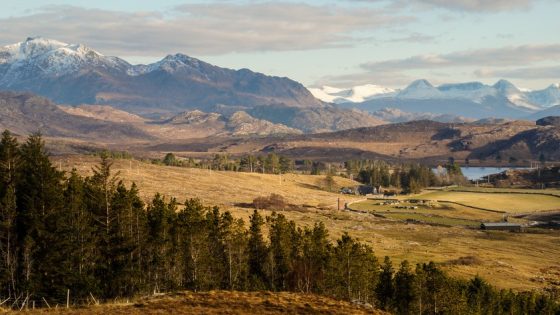Official advisor savages Scotland’s climate plans, which it says are ‘no longer viable’

This post was originally published on this site

Scotland will not meet its 2030 statutory target of a 75% reduction in greenhouse gas emissions, according to the Climate Change Committee (CCC).
The comments come as the CCC submits its Progress in reducing emissions in Scotland – 2023 Report to Parliament, where it said Scotland missed its annual target for 2021, which is the eighth time in the past 12 years that it had missed a target.
The climate advisors have a statutory responsibility to assess and make recommendations about climate policies to the UK governments, as per the Climate Change Act 2008.
The CCC said repeated delays to Scotland’s updated climate change plan and slippage in its climate policies mean the CCC “no longer believes that the Scottish Government will meet its statutory 2030 goal to reduce emissions by 75%” and added, “There is no comprehensive strategy for Scotland to decarbonise towards net zero.”
While the advisors believe there is no way to achieve the 2030 target, the committee said there was still “a path” to targets set for after 2030. It said to achieve these, stronger action would be needed to reduce emissions and said “the transport and buildings sectors will require a particularly rapid increase in the rate of emissions reduction to meet the targets set out in the last Climate Change Plan update (2020 CCPu).”
The CCC assessed the sectoral targets set out in Scotland’s Climate Change Plan update (CCPu) 2020 and found that dramatic accelerations in decarbonisation and carbon removals would be needed to stay on track for 2030.
It found that emissions reductions in heating buildings would need to increase by a factor of ten to stay on track, and transport decarbonisation would need to increase by a factor of almost four.
Climate Change Committee interim chair Prof Piers Forster said: “Scotland has laudable ambitions to decarbonise, but it isn’t enough to set a target; the Government must act.
“There are risks in all reviewed areas, including those with significant policy powers devolved to the Scottish Government.”
Forster said the delayed CCPu needed “to be published urgently, so we can assess it. We need to see actions that will deliver on its future targets.”
RSPB Scotland senior land use policy officer Andrew Midgley said: “Climate change is one of the greatest long term threats nature faces.
“The failure to make progress toward targets is deeply worrying and should serve as a wake up call for all parties to recommit to action that reduces emissions and renews nature. Scotland is one of the most nature depleted countries in the world.”
Midgley made the point that the nature and climate crises are “one and the same” and said “without saving nature we cannot tackle the climate crisis.”
“By investing in nature through measures such as peatland restoration and woodland expansion, and incentivising a shift toward sustainable methods of farming, we can get Scotland’s net zero ambitions back on track for people and for wildlife.”
WWF Scotland energy policy manager Fabrice Leveque said: “Although not unexpected, this report is yet another reminder of the Scottish Government’s failure to act with the speed required and this just isn’t good enough.
Leveque called on the Scottish Government to “get serious” on delivery.
“The more we delay, the more we add to the climate crisis and the longer people have to wait for the benefits of lower energy bills, warmer homes, healthier air and nature recovery,” Leveque continued.
Friends of the Earth Scotland head of campaigns Imogen Dow said: “The chickens have come home to roost for a Scottish Government that has repeatedly failed to implement the changes needed since the introduction of the climate targets over a decade ago.
“This is an embarrassing and abject failure of politicians to deliver on their legal commitments to the Scottish people.
“Good climate policies are popular and can change people’s lives for the better from warm, well-insulated homes to affordable public transport run in the public interest.”
Dow said Scottish Government ministers, which includes representatives of the SNP and Green parties, “have been either unwilling or unable to stand up to the oil lobbyists, the car fanatics and the climate delayers who have blocked necessary progress.
“The improved 2030 climate target was supported by all the parties in the Scottish Parliament just a few years ago, so every MSP must be redoubling their work to ensure we can deliver on this vital commitment.
“We look forward to a strong Climate Change Plan to be published ASAP so that we have a clear strategy on how the Scottish Ministers will reach these legally binding targets.”
Keep Scotland Beautiful deputy CEO Catherine Gee said: “We are all frustrated at the speed at which our journey towards net zero is travelling.
“And we are disappointed to hear experts say that Scotland’s climate targets are ‘no longer credible’.
“But, equally we recognise just how important it is for us all to focus on the positive and to celebrate what is changing here in Scotland.
“We will carry on inspiring action on climate change, and are committed to supporting Scotland become a carbon literate nation through our training and celebration of the progress that business and organisations are making on their journey to net zero.”
Carbon Capture and Storage Association CEO Ruth Herbert said: “The Climate Change Committee report highlights why it is critical that Track-2 of the government’s CCUS cluster programme moves into construction as soon as possible, if the Scottish Cluster, based on the Acorn CO2 storage project, is to be operational by 2030.
“It also points to the importance of sticking to planned timelines for CO2 infrastructure, where industrial employers who need carbon capture to continue their operations under increased carbon prices face the risk of closure without it.
“We are still waiting for construction to start on Track-1 clusters, so it’s clear that time is running out to achieve both Scotland’s 2030 climate goals and the UK’s Net Zero Strategy target of 20-30Mt/year stored by 2030, and de-industrialisation cannot be the right answer.”
Scottish Greens climate spokesperson Mark Ruskell MSP said: “The CCC is absolutely right that both the Scottish and UK Governments need to be bolder and act faster.
“It should come as no surprise to anyone that this is exactly the message my Scottish Green colleagues and I have been pressing with our government partners and officials.
“For too long too little was done. That’s why the Scottish Greens entered into our cooperation agreement.
“Since then, we have made big steps forward, the climate committee has recognised the progress made on home heating and renewable electricity. But there is still a major gap in action and this is the moment to move up a gear.
“This is particularly true for farming and transport, which for too long have seen too little progress.
“This is where the biggest challenge now lies, and Scottish Green MSPs will be pushing hard for progress in these areas over the coming months.
“We are now at last in a better position to be working with the farming sector to drive change, and this must be reflected in the new Agriculture bill, which the Scottish Greens are helping to shape.
“The acknowledgment from the committee that Scottish Green policies on expanding renewable energy to decarbonising homes and buildings, accelerating peatland restoration, and cutting emissions from aviation and road vehicles are the right ones, is welcome.
“With our colleagues in government, we remain committed to delivering for our climate and pushing on the vital next steps needed to get there before 2045.”
Scottish Government Net Zero Secretary Mairi McAllan said: “I am grateful for the latest advice from the Climate Change Committee 2023 report.
“The Climate Change Committee have always been clear that meeting the legislated 2030 target – agreed by Parliament on a cross-party basis – will be extremely challenging, and may not be feasible.
“We remain fully committed to meeting our target of net zero emissions by 2045, and in 2024-25 alone we are committing £4.7 billion to support the delivery of our climate change goals.
“Scotland is already half way to net zero and continues to decarbonise faster than the UK average.
“In the last five years we have created around 75% of all new woodlands throughout the UK in Scotland, launched the world’s largest floating offshore wind leasing round through Scotwind, ensured Scotland has the most generous concessionary scheme in the UK with more than a third of the population benefiting from free bus travel and invested over £65 million to support the installation of over 2,700 public EV charge points ensuring Scotland has the best provision of public charge points per head of population in the UK, outside of London.
“However, we are under no illusion that the hardest part of this journey is ahead of us which is why our ambitious proposals for delivery include publishing a final route map setting out our approach to reducing car kilometres by 20% by 2030 and decarbonising buildings through our plans for a Heat in Buildings Bill.
“These underline our commitment to further reduce emissions whilst ensuring fairer, greener transport and homes as well as high-quality green jobs.
“However, over the past 12 months Scotland has faced a series of unprecedented changes by the UK Government, who have reneged on their net zero commitments, and rolled back on policies already announced and accounted for.
“We are also expecting a real-terms cut to our UK capital funding of almost 10 per cent over five years, totalling around £1.3 billion, which is deeply concerning given it has implications for the delivery of climate ambition in Scotland and our ability to produce a draft Climate Change Plan as intended.
“We have also faced opposition to modest measures in tackling the crisis, such as low emission zones, workplace parking and the deposit return scheme at a time when consensus is crucial to ensure that we have a sustainable planet.
“We will now carefully consider the report’s recommendations and our next steps – including legislative options – before providing a formal response.”
Like what you’ve read? To receive New Civil Engineer’s daily and weekly newsletters click here.





Responses